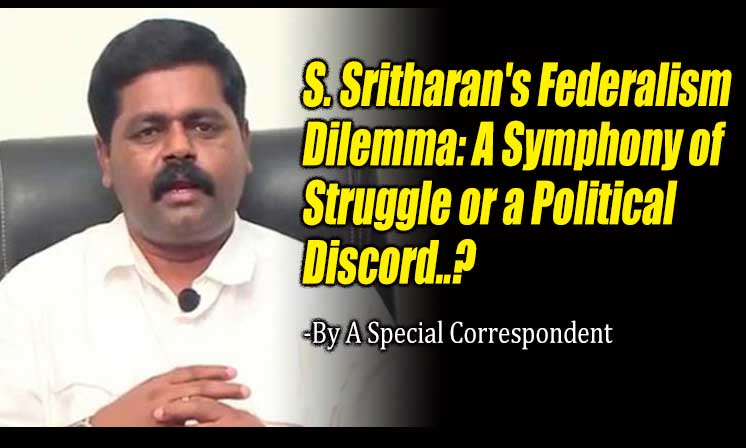-By A Special Correspondent

(Lanka-e-News -29.Jan.2024, 10.00 PM)
For decades, Sri Lankan Tamils have yearned for a distinct region where they can organize an autonomous administrative state, safeguarding their culture, language, and economic development independently from the central government in Colombo. With the emergence of S Sritharan as a new leader of IATK, questions arise about his ability to deliver the long-sought-after Federal state for Sri Lankan Tamils living in the North East region.
Sritharan vows to champion the cause of a Federal state for Tamils, prompting speculation about his close ties with New Delhi. Reports suggest that Sritharan is attempting to persuade Tamil leaders to join him in negotiating with the Sri Lankan government to devolve powers to the Tamil administration rather than being controlled by Colombo.
The article explores the delicate balance Sritharan must maintain between advocating for Federalism and potential conflicts with New Delhi's interests. As the BJP government attempts to quell Tamil Nationalists in Tamil Nadu, the question arises: Will Sritharan's Federalism tunes irk New Delhi? The analysis delves into the intricacies of New Delhi's strategy to divide Sri Lankan Tamil politicians to weaken the Eelam ideology, ultimately benefiting Colombo. Sritharanism is portrayed as a new Tamil nationalism tune, yet the article questions Sritharan's experience compared to veteran composers like AR Rahman or Ilayaraja, suggesting that his Federalism tune may have limitations dictated by New Delhi's standards.
The struggles of Sri Lankan Tamils for political rights met with an iron fist, not only from the Sri Lankan government but also from Indians who intervened in the conflict. The article explores the dilemma between advocating for Federalism and seeking international justice. Sri Lankan Tamils seek justice for massacres and the 1983 riots, blaming UNP thugs, including current President Wickramasinghe and opposition leaders, for brutal violence against Tamils. The article argues that international justice cannot be achieved through Sri Lankan mechanisms, given the lack of trust from the Tamil diaspora. It proposes that a UN-led mechanism might be the optimal solution.
Examining India's role, the article suggests that India, fearing Chinese involvement in Sri Lanka after losing influence in the Maldives, may play a part in seeking international justice for Tamils. However, this strategic move could backfire, as Tamils might accuse Indian soldiers of brutality during the 1987-1991 period in the North East of Sri Lanka.
The conclusion questions Sritharan's ability to move forward with his Federalism ideology, speculating that India's lack of support due to fears of repercussions in Tamil Nadu might hinder his efforts. Sritharanism is depicted as a loud proclamation without substantial impact, emphasizing Sritharan's limited experience in working with Western countries and his perceived alignment as an Indian "yes man." The article predicts that Sritharan's Federalism act may cause disturbances among Tamil youth in the North East of Sri Lanka, further complicating the intricate political landscape.
---------------------------
by (2024-01-29 16:35:16)
Leave a Reply